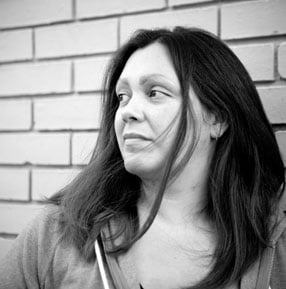after Obergefell v. Hodges, summer 2015
I still have a question to ask—
what I don’t know is which words might compose it.
I know it lives, but where it might begin—
I have to squint like I do as it downpours
in the mountains; I cannot read the road.
Driving after dark, we feel the way, the last two
who don’t roam where others seem to—
I have told at least that many I would marry you
but neither sees our names before the code.
We seek no coverage, lower tax,
don’t imagine asking those we love
to stand for something we’d keep privately. I already
swear a dress each day we wake together,
use present tense verbs as often as
they tell the present truth. What I want to ask
is daily. I want to ask it in our houses, in our tent.
I want to find our roads however long they are
as we go, for you to realize my stories
and the details of their slower telling.
Would I say what I say in front of others,
yes. I want to say it all the time
in moments equal to one another, and for time
to unfold continuously, arrive continuously
from each measure as it’s made.
We’ll find a motel tonight if we have to, or sleep
in the car that smells of our bodies unshowered,
fueled by coffee and cheese eaten off the atlas,
nuts shaken in cinnamon—what matters most
is that I might still kill your sense of what is
every time I move into your body
the force it makes me. I want the question
live as it sounds: do you yet want
beyond a promise of anything.
I do not wish to turn from hunger. I could not
marry you absent the jagged world
that multiplies, complicates—may we marry
all grief, all longing, all shapeless dissatisfaction,
all long walks distance from our origins.
Do not leave. Walk as long as you can alone,
push back hard when you object to my position.
Divorce me every moment you decide
who you are and where you should
next be. Make your way. Make it
through me, some days, pushing through my body,
through our ties. Come through yourself
as though you have all the time in the world
even as it’s always subtracting
something from itself. For music, let’s sing
absently—I don’t want to translate even once
what we mean when we stand across
from one another speaking. No symbol
assigning something else. I feel
the dress—I feel its excellence
gelling, multiplying, becoming voluminous
for me and us; I feel it peeling back
transparence as it releases.
Appear, my love, so I can step out of myself.
Make me undressable, make it impossible
for me to clothe myself, make the garments
the lies they are—attend this living
as blatantly as anyone living must, awake
to meanings carried from meaningless things.
That is all I ask. There is no moment
we could exchange our words. We will
repeat nothing, just pray we provoke
each dark as we go, go with all that begs
to marry itself to some ever-casting horizon,
to marry itself to the furthest away thing.
Horizons always move, make an argument
about time, pray something.
Would I too? Is that how I find myself?
Would I bend to recognize
the curve I make around my center, keep
a center, bend toward it equally at every point?
Bend, love, I imagine myself saying,
to where you find me, wherever I may be,
wherever you find that bending becoming
your will and your innate way. I bend and pray
you’ll marry my unfixing, as I will always be,
or draw back from what you believe of me—
that you might bend harder than law allows,
that we might never marry civilly.
Copyright © 2017 by Rae Gouirand. “Not Marrying” originally appeared in the winter/spring 2017 issue of diode poetry journal. Used with permission of the author.

